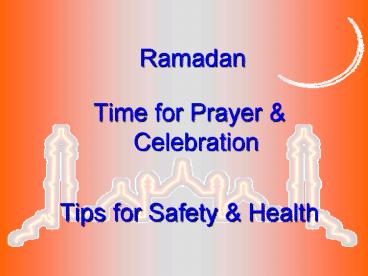Ramadan - PowerPoint PPT Presentation
1 / 24
Title: Ramadan
1
Ramadan
- Time for Prayer Celebration
- Tips for Safety Health
2
Diet and Sleep habits change during Ramadan
- If in good health, your body will slowly adjust.
Here are some things you can do to help.
3
Diet Change - How does it affect us?
- Not drinking or eating during daylight hours is a
big change for most of us. - Fasting can cause temporary low blood sugar and
dehydration.
4
Low Blood Sugar
- Occurs when the sugar (glucose) in the blood
drops to a lower than normal level. - Can be caused by fasting.
- What you might feel tired, irritability,
headache, faint or light-headed, hunger, loss of
concentration.
5
What you can do
- because our body does not digest food well at
night, even if we stay awake. - Use Iftar to eat a healthy diet shortly after
nightfall and eat well at Sahoor
6
Eating well
- Foods that provide energy
- Pasta, rice and potatoes
- Whole grain breads and cereals
- Fruit and vegetables
- Fish, lean meats
- Soybeans, tofu and beans
- Skim or low-fat milk and cheese products.
7
Eating poorly
- Difficult to digest, avoid at night
- Fatty meats
- Fried foods
- Pastries
- Potato and corn chips
- Pizza
- Whole milk dairy products
8
Dehydration
- Dehydration occurs when the amount of water in
the body falls below normal, which can disrupt
the balance of sugars and salts (electrolytes)
9
Dehydration
- What you may notice
- Darker yellow urine
- Weakness, fatigue
- Feeling faint or lightheaded
- Headache
- Intense thirst
- Dry or sticky mouth
10
What you can do
- Drink lots of water after Iftar and at Sahoor
(try for 8-10 glasses in total) - Drink WATER. Our bodies cannot use other drinks
properly. We only absorb only 50 to 60 of
fruit juice and only 20 to 30 of soda.
11
What you can do
- Use Sahoor to ensure you have satisfied your need
for water before the new day begins. - Avoid Coke/Pepsi/soft drinks that contain
caffeine. - Caffeine dehydrates you - avoid it, even coffee,
in the morning.
12
What are your experiences?
- Discuss now your previous fast experiences during
Ramadan. What works for you, what doesnt work?
13
Sleeping
- In addition to fasting, sleep habits often change
during Ramadan. - We may stay up late at night or get up early in
the morning for Sahoor.
14
How will I feel?
- If you have not had enough sleep you might feel
- impaired performance
- irritability
- lack of concentration
- daytime drowsiness
- You might also be
- less alert and attentive
- unable to concentrate effectively
15
Real problems caused by lack of sleep
- Many tragedies linked to human error were due to
exhaustion
16
Real problems through lack of sleep
- The most common consequence is sleeping behind
the wheel. - One third of all drivers will fall asleep at
least once in their lifetime.
- The annual cost of car accidents
- US 30 billion
- 100,000 crashes
- 71,000 injuries
- 1,500 fatalities
17
How much sleep do I need?
Peak Alertness
Slightly Impaired
Reduced Alertness
Dangerously Drowsy
5
6
7
8
1
2
3
4
9
0
Hours of Sleep Prior Night
18
Seven to Eight Hours of uninterrupted sleep is
important to everyones health and well-being.
19
How much sleep do I need?
- There is a sleep bank account
- The effects of lack of sleep build up after each
night of not sleeping well or not sleeping enough - If one night you dont get much sleep, try to
make up for it the next night. - Recovery Days - Take it easy the first day off
and catch up on your sleep.
20
What are your experiences?
- Discuss now your previous experiences during
Ramadan. Did you get less sleep than normal? If
so, how did you handle your sleepiness during the
day?
21
High Risk Times
- You are most at risk for safety problems caused
by fasting/poor sleep at these times - While Driving
- Between 12 noon and 3 p.m.
- The first few days of Ramadan
- Your first two days working after days off
- Near the end of the work day
- When activity levels are high in your work area
22
Preventing accidents means caring for each other
- Work with your team / crew members to help each
other when feeling tired. - Let your supervisor know when you dont feel up
for a hazardous task - Talk about hazards and make sure everyone is
aware of them!
23
Summary
- The effects of fasting, low blood sugar, Lack of
smoking for some people and dehydration, can add
to lack of sleep and place you at risk of an
accident. - There are steps we can take to improve and
protect our physical health during Ramadan. - By communicating hazards and letting others be
aware of our physical condition we can work
together to stay safe. - Be careful on the road of other drivers physical
condition. - Stop vehicle when feeling sleepy!
- Dont be late when leaving to break fast - Speed
kills!
24
RAMADAN KAREEM

